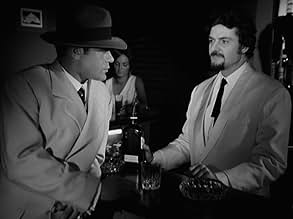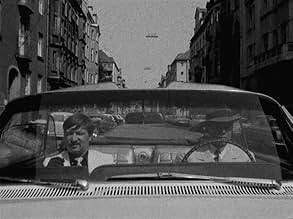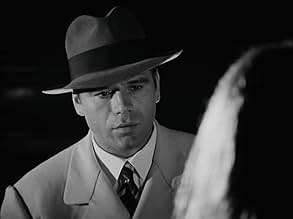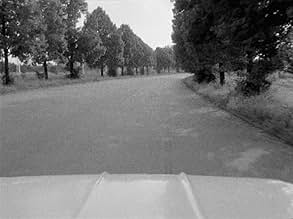The American Soldier has a story, maybe even a plot, but that's not why Rainer Werner Fassbinder made this movie, I believe. It's more about an attack or subversion on the style of a movie, in this case the film-noir. The black and white makes the comparison a little obvious, but it's also in the attitudes of the characters, the costumes and clothing that distinguishes a character like Ricky. But it also owes as much to New-Wave tactics like Godard and Melville (Le Samourai and Alphaville come immediately to mind), and to Fassbinder's own sense of alienation with the world as well as in his own films. It's sometimes hard to watch, since his character carry the same weight of angst and dread that they barely really show to one another, but it's still an intriguing trip.
The story that is there actually reveals more about a German viewpoint than that of it being American, though I'm sure its protagonist and its background is significant just for this reason. It's about a soldier back from Vietnam who is recruited by the government, who act much in the way of a discreet crime organization, to carry out killings of people who may (or may not?) be nefarious characters, or just people whom Ricky doesn't know why he's killing. The implication is somewhat more satirical than action-movie based (though I'm reminded, sadly, of Wolverine earlier this year and movies like it that don't get the message), that a killer keeps on killing if without the right sense of moral well-being or even self-worth.
Fassbinder amps up some clichés for the film-noir aesthetic by making it a pulpy-crime story, where a prostitute falls in love with Ricky even as she shouldn't or might just get in the way. He also casts his parts very well, especially with Karl Scheydt as Ricky (makes Glenn Ford look like a wimp) and Elga Sorbas as Rosa, the attractive but uncertain prostitute who falls for Ricky (there's an engrossing scene where he calls up to ask for a girl to his apartment room, she comes and undresses, and then the two just lay in bed while a maid is in the room telling a somber story about a romance gone bad). All of the cinematography is at least interesting, and at best represents a maturity in film-making for Fassbinder after his first couple of films (Love is Colder Than Death, Katzelmacher) that were just a series of static shots.
Some have brought up criticisms of its tedious nature, or that it's just boring. It's hard to argue it since it's based on taste; the same scene that could make on bored (and, frankly, it's not a good movie to watch when tired at two in the morning) could also make a Jim Jarmusch fan gripped to the chair one's sitting at. Characters in The American Soldier don't move too realistically - it's more like in Fassbinder's own The Merchant of Four Seasons; people move and talk and look like they've come out of a shell-shock, or may still be in one. Even the cop characters, or Ricky's mom and brother, are in a slight daze as they speak, and this is deliberate. It ends up making for a more intellectually satisfying experience than an emotional one; I wasn't so much moved by the ending, where we see a character's death (one usually typical in a film-noir of the 1940s in America, as in bad-guy-gets-his by the end) in the context of a poetic mourning, but it did fascinate me.
It's sometimes tough going, and its rewards are for a real geek for black and white New-Wave inspired crime films that have such gimmicks as a rock song that repeats in lieu of a usual orchestral sound, and its not for someone looking for fast action and conventional thrills. It is, in its dimensions, arty, and fine with it.

































